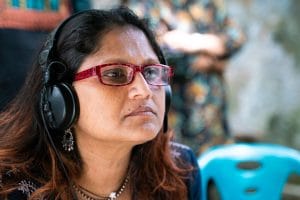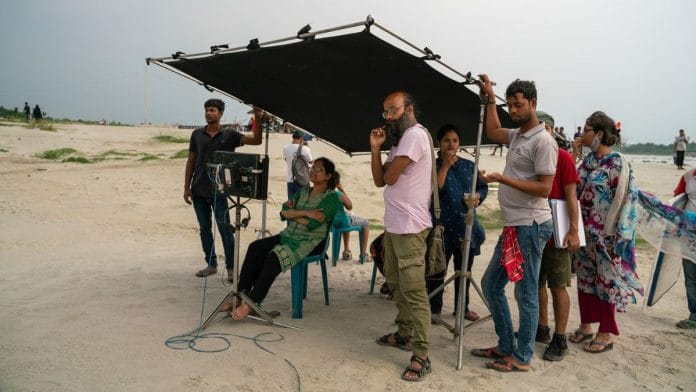New Delhi: Bangladeshi-born Leesa Gazi’s second film as a director, Barir Naam Shahana — A House Named Shahana, follows a divorcee trying to rebuild her life in Dhaka. It is also, in many ways, the story of Gazi herself, the London-based writer and actor whose own divorce in the early 1990s pushed her life forward in ways she hadn’t imagined. That same stubbornness has now carried her to become the first woman filmmaker from Bangladesh whose film has been selected as the country’s official submission for Best International Feature Film at the 98th Academy Awards.
“I wanted to include moments of lived experience in the film and have women characters who help you break barriers — or are pathbreakers themselves, without even being aware of it,” said Gazi.
In Barir Naam Shahana, the protagonist Dipa (Aanon Siddiqua) is coerced into a long-distance nikah with a widower in England. Soon after, she endures abuse but eventually finds the courage to escape back to Bangladesh. What follows is familiar in many South Asian households — Dipa is branded a disgrace and a failure. Yet she convinces her parents to support her education and, over the years, becomes a qualified physician.
Gazi’s own story runs parallel to Dipa’s. At 22, she walked out of her marriage, choosing freedom over conformity. In the years that followed, she faced the loss of her father — a veteran of the Bangladesh Liberation War — and her mother’s desperate attempts to “repair” her daughter’s “broken” marriage.
“Divorce is seen as the failure of that one fundamental responsibility of a South Asian girl — marriage. And it was also seen as my mother’s failure,” said Gazi. “At a cousin’s wedding, I was told not to attend because divorced women are [considered] ‘bad luck’.”
The Komola Collective
Gazi had to finalise her own divorce, hiring a pro bono lawyer before taking up a marketing job that involved distributing detergent samples to low-income households in exchange for survey data. Determined to succeed, she eventually joined Procter & Gamble, where she even coined the now-iconic tagline “Ariel elo, daag moila gelo (Ariel in, stains out”) for the brand’s Bangladesh campaign.
Her work in advertising led her to learn scriptwriting and copywriting, sparking a creative curiosity that drew her toward the stage. She soon joined the Dhaka-based theatre group Nagarik Natrya Sampradaya.
After remarrying, Gazi moved to the UK with her husband, but found herself, in her own words, “a fish out of water”, unsure what her next phase of career would be. She took up a job at Bangla TV, a community channel, where she produced the weekly show Aei Jonopode. In 2008, she joined the prominent South Asian Theatre company Tara Arts and adapted the play Sonata.
That same year, she co-founded Komola Collective, an ensemble of four women theatre practitioners and filmmakers from diverse creative backgrounds, united by a shared mission to tell stories of women often left unheard.
“I began this journey to make a film about some of the extraordinary Birangona women, survivors of sexual violence during the Liberation War of Bangladesh, whose stories I heard from my father,” said Gazi.

She travelled to Sirajganj to meet survivors, recording their testimonials. The footage later became part of her acclaimed theatrical production Birangona: Women of War, directed by Filiz Ozcan and scripted by Samina Lutfa. The play, based on Gazi’s concept and research, featured her as the central performer.
The play was nominated for The Offies (UK) and went on to evolve into Gazi’s first documentary feature, Rising Silence. The film won 15 international awards, including Best Documentary at the 2019 Dhaka International Film Festival, the Asian Media Award for Best Investigation (UK), and the Moondance Award in the feature documentary category (USA).
The success of Rising Silence gave Gazi the impetus to make her first narrative feature. Barir Naam Shahana went on to win the Gender Sensitivity Award at the Jio MAMI Mumbai Film Festival 2023 and was screened at the London Indian Film Festival, Dhaka International Film Festival, and Kolkata People’s Film Festival.
But for Gazi, this is just the beginning.
“One thing I have and which I like about myself is that it’s very hard to discourage me. I have heard ‘no’ so many times, but that did not stop me. To make Barir Naam Shahna, I used up my life savings,” said Gazi.
Also read: Amitabh and Amjad’s real-life friendship played out in Yaarana. It’s usually different on-screen
The future of Bangladeshi cinema is now
It was sheer luck, Gazi said, that she discovered — while in Bangladesh for the film’s theatrical release on 19 September — that the official deadline for Oscar submissions would close in just two days. She quickly completed the process, and on 17 October, Barir Naam Shahana was announced as Bangladesh’s official submission for Best International Feature Film at the 98th Academy Awards.
The film beat out Nakshi Kanthar Jamin, Priyo Maloti, Saba, and Mayna to secure its historic spot.
The Oscar shortlist for Best International Feature Film will be announced on 16 December, followed by the final five nominees on 22 January 2026.
“Currently, I am co-writing the script for my second feature film, Shasti (Punishment), with Aanon Siddiqua and Sadia Khalid Reeti,” she said. “It’s inspired by Rabindranath Tagore’s short story of the same name. The film will be a contemporary spin on the beloved classic.”
Gazi is hopeful about the direction of Bangladeshi cinema.
“The world is kind of taking Bangladeshi films seriously, especially in the last decade, with the kind of stories coming out of the country,” she said.
(Edited by Prashant Dixit)






